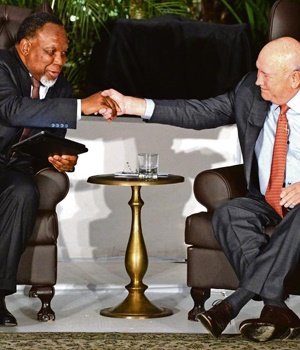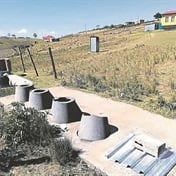
The one president was the bridge between hard-core apartheid and the birth of democracy. The other was the bridge between a South Africa of hope and a country whose future stability is increasingly coming under scrutiny.
The setting was Rhebokskloof Estate in the picturesque Cape winelands on Thursday.
The discussion between FW de Klerk and Kgalema Motlanthe was billed as 21 years of democracy and the future of our country.
Moderated by KykNet anchor Freek Robinson, the conversation saw the two former heads of state dissect the country they once ran – De Klerk after his party deposed PW Botha in 1989 before his term had run its course, and Motlanthe for a brief period after his party did the same to Thabo Mbeki in 2008.
De Klerk was still his old oratorially strident self, giving no indication of rust. Motlanthe adopted his usual teacher posture, seeking to educate his audience about South Africa’s challenges beyond the gasp-inducing headlines.
For De Klerk, the prime cause of the crises facing the country is the stranglehold on power that the SA Communist Party (SACP) gained in the aftermath of the “Polokwane coup”, when Mbeki was toppled from the ANC leadership. If you closed your eyes, you would have sworn you had been placed in a time machine and dropped off at a National Party election campaign meeting in the 1980s, the era of the “rooi gevaar” – the communist threat.
Saying that “we have reached a crossroads” and “the time has come to speak frankly”, De Klerk spoke darkly about the reversal of the gains the country had made since becoming a democracy. The 1994 miracle with which South Africa had inspired the world was being undone by a national leadership led astray by a powerful communist clique that had grabbed the levers of power after Polokwane.
“Everything we have achieved is at risk now in 2015 ... The Polokwane coup has had only negative consequences for South Africa,” he said.
After removing Mbeki and undoing his “orthodox economic polices that had achieved 5% growth levels, reduced the national deficit and attracted foreign investment”, the post-Polokwane ANC adopted the SACP’s “socialist and state-directed approach”, which had been ruinous. Without winning a single vote, De Klerk charged, the SACP had “entrenched its hegemony in all the centres of state power”.
Not only did it control 40% of Cabinet posts, its cadres were strategically placed in the presidency and economic departments. Wherever these communists are to be found, they are implementing rigid socialist-oriented policies. Minorities are particularly vulnerable as these radical policies include rigid enforcement of demographic representation in various facets of national life, and the deprivation of their property rights. But the majority should not rest on their laurels as these communists and their actions are “a dire threat us all”.
“The achievement of the SACP’s publicly acknowledged goal of establishing a communist state would bring to an end our constitutional democracy and freedoms of all South Africans,” he said.
This assault on the 1994 consensus and its replacement with a “second transition” would be opposed “with all the powers that the Constitution has placed in our hands”.
De Klerk’s dire warnings about Bulgaria coming our way and the war on minorities struck a chord with this Boland audience, who applauded him generously.
Without directly contradicting De Klerk’s doom and gloom diagnosis, Motlanthe painted a picture of a functioning democracy that is characterised by vibrant political party and civil society activity, and in which “the permanence of democracy is not in doubt”. Saying people “should not fret about the ANC and the SACP”, Motlanthe said South Africans’ primary focus should be on building a “stable and efficient state” that is not dependent on any political party or political leader.
The high turnover in senior government was worrisome, he said, because it “indicates a failure to recognise the importance of a stable state”. The creation of this state was necessary for entrenchment of democracy and dealing with the “accumulated disabilities”.
“We need a state that is stable and efficient in order to consolidate democracy and move the country forward,” said Motlanthe.
The “accumulated baggage” included 3 million youngsters who cannot enter the job market and are sitting idle, which Motlanthe said was “a tinder box waiting to be set alight”.
Motlanthe had firm words for his former colleagues in government, warning that policy chaos was a major impediment to investment, saying “policy uncertainty drives investors away”.
He had even harsher words for his ANC comrades who shut opponents up, by saying the verbal intimidation of opposition parties in Parliament was out of order.
“I am ashamed when I see members of my party addressing members of the opposition as people who have no right to express views because they were liberated by us. I’m ashamed because this is factually incorrect. We cannot assume a posture that says ‘you enjoy freedom as a gift from us’. Then we cannot lead society because that’s an exclusive posture. It’s a posture that is pre-1994.”
On corruption and accountability, Motlanthe urged South Africans to strengthen and protect chapter 9 institutions, especially the office of the Public Protector.
“A society that has no accountability is a society that invites anarchy,” he said.
The two leaders struck different poses: De Klerk leading a crusade and Motlanthe rising above the fray. The different postures perhaps spoke to the roles they are playing and the legacies they are carving out for themselves. De Klerk is increasingly casting himself in a role, through his foundation and in his personal capacity, as a defender of the peaceful transition that he and Nelson Mandela engineered.
Motlanthe is now on the peripheries of ANC power, but still wields influence quietly. He sees his place as more of an elder statesman who is able to reach across society.




 Publications
Publications
 Partners
Partners








